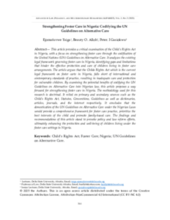This article provides a critical examination of the Child's Rights Act in Nigeria, with a focus on strengthening foster care through the codification of the United Nations (UN) Guidelines on Alternative Care. It analyzes the existing legal framework governing foster care in Nigeria, identifying gaps and limitations that hinder the effective protection and care of children living in foster care arrangements. The article argues that the Childs Rights Act which is the current legal framework on foster carte in Nigeria, falls short of international and contemporary standards of practice, resulting in inadequate care and protection for vulnerable children. By examining the potential benefits of codifying the UN Guidelines on Alternative Care into Nigerian law, this article proposes a way forward for strengthening foster care in Nigeria. The methodology used for this research is doctrinal. It relied on primary and secondary sources such as the Child’s Rights Act, Statutes, Conventions, Guidelines as well as dictionaries, articles, journals, and the internet respectively. It concludes that the domestication of the UN Guidelines on Alternative Care under the Nigerian Laws would provide a comprehensive framework for foster care practice, prioritize the best interests of the child and promote family-based care. The findings and recommendations of this article stand to provoke policy and law reform efforts, ultimately enhancing the protection and well-being of children living under the foster care settings in Nigeria.

